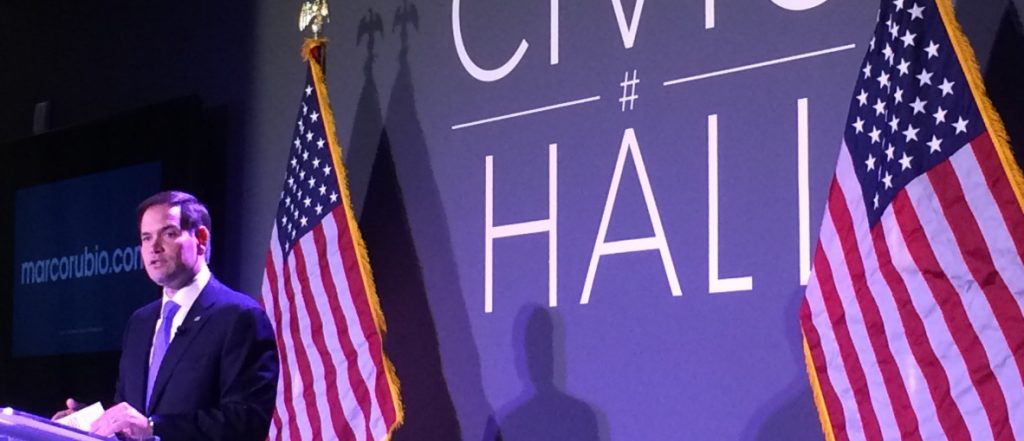MARCO RUBIO DISCUSSES THE ON-DEMAND ECONOMY
- JESSICA MCKENZIE
- October 6, 2015
- 6:11 pm
Marco Rubio weighs in on the on-demand economy, innovation and disruption, money in politics, and platform cooperativism.

This morning Republican presidential candidate Marco Rubio dropped by Civic Hall to deliver a prepared speech on the on-demand economy, followed by a Q&A with Civic Hall founder Andrew Rasiej. In his speech, Rubio touted the advantages of the on-demand economy, including upward mobility, flexibility, and independence. He argued that all of the “best innovation is happening in the unregulated space” and said his proposed tax reform plan would make the tax code more welcoming to the on-demand economy. Many of Rubio’s prepared comments tracked with other speeches he has given on the subject, although this one was without any explicit jabs at fellow candidates.
Rubio highlighted New York-based Handy as an innovative startup facing overregulation, and said another entrepreneur he met recently asked him not to name his company publicly to avoid drawing the attention of legislators.
Rubio called for a new category of worker, pointing out that those with W2 status have more protections but fewer of the freedoms that characterize the on-demand economy, but if employees are categorized as independent contractors, employers are prevented from training them or otherwise dictating how something is done. Rubio argued that a middle ground is needed, pointing out Germany already has a third category for “dependent contractors.” He added, “Whether or not this model is the best for America is something we have to figure out.”
To cut down on innovation-stifling regulation, Rubio proposed a cap on the amount that regulations can cost the economy, saying current compliance costs approach $70 billion. Rubio singled out regulation lobbied for by incumbent interests like the taxi and hotel industries for hindering competition.
When Andrew Rasiej pushed him on the root issue that makes it possible for established interests to have their way—money in politics—Rubio first said that small government is the answer: If unlimited regulation is an option, he argued, incumbent interests will “find a public safety argument and use that to put up a roadblock.” In response to Rasiej’s follow up question, again about the influence of money in politics, Rubio said that the American people should “stop electing” people susceptible to that. But he didn’t offer any ideas for how to achieve that.
Citing the impact of Airbnb on the housing market, Rasiej asked how the government could minimize the collateral effects of the on-demand economy without regulation. Rubio responded that he’s not against all regulation—he’s glad that his drinking water isn’t poisoned and that someone is checking on the planes he flies on—but added that “structural change in the economy has always been very disruptive” and pointed out that the industrial revolution brought about a number of new issues, including child labor, that had to be resolved.
Rubio repeated himself somewhat when a member of the audience—an independent taxi driver—asked whether new companies and drivers should have the same access to the market that he has, but without paying the same fees. Rubio first replied that he doesn’t think it’s the same model, but reiterated that innovation is always disruptive, citing the impact of the car on the horse cab driver. Rubio said that it is the role of government not to prevent innovation, but to help people affected get access to the new innovative economy, whether through education or other means.
Rubio was dismissive of the potential for worker-owned cooperative platforms to compete with other startups, saying, “I don’t think you’re going to get innovation that way…people aren’t driven to do it if they don’t see the opportunity to make money.”
Finally, when asked by Rasiej whether he would continue to support the U.S. Digital Service if he were elected president, Rubio said, “If it proves that it’s something that is effective and that it can attract the brightest minds to improve how government works, then that’s something we should definitely continue.”

